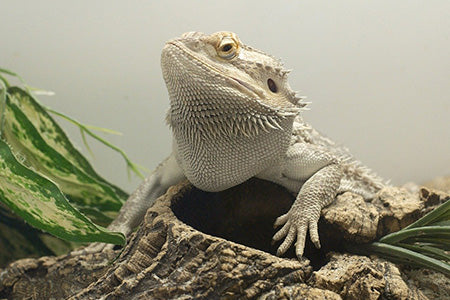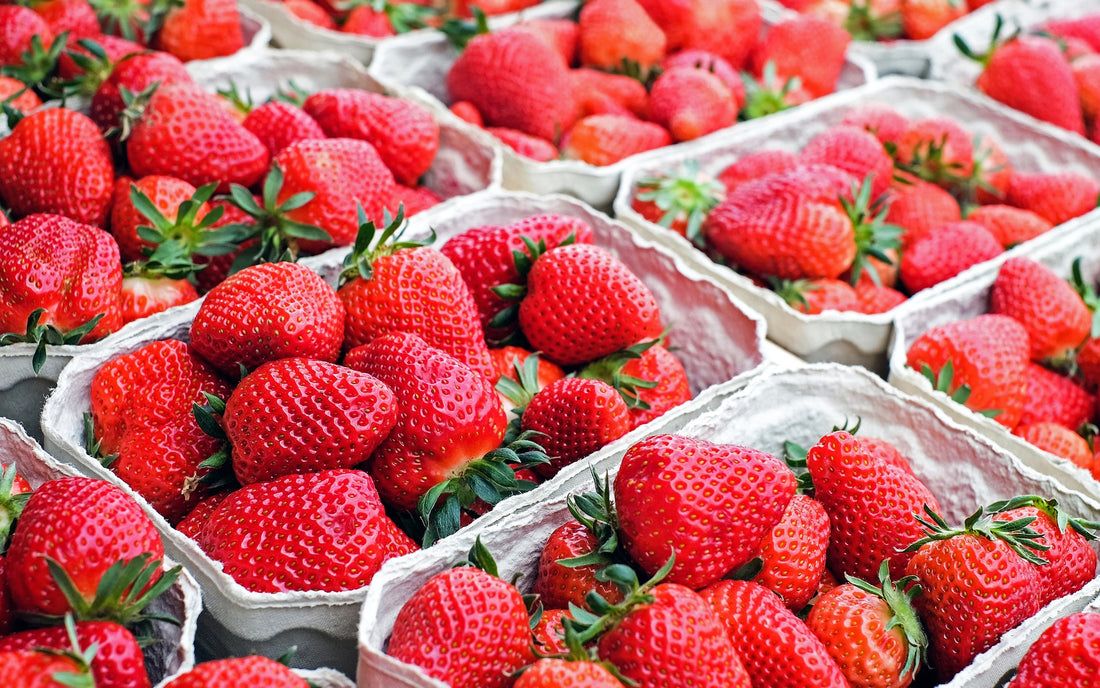Whether they’re topping off a shortcake or a salad, strawberries are a delicious treat for people everywhere. You may be wondering if your beardie would love this versatile fruit as much as you do. Are they safe for our reptile friends? Can bearded dragons eat strawberries?
Bearded dragons can eat strawberries, but only in moderation (as is the case with all fruits in their diet). On the bright side, strawberries—like apples—are considered one of the safer fruits for dragons, meaning you don’t necessarily have to limit them to once a month.
How Often Can Bearded Dragons Have Strawberries?
Strawberries have high nutritional value for people and beardies alike. They also have a relatively lower phosphorus to calcium ratio compared to other fruits, although the amount of phosphorus in strawberries is higher than the amount of calcium. (More on that later.)
Strawberries are also really easy for dragons to eat since they are so soft and the seeds are too small to pose a choking hazard. You’ll want to avoid feeding the stems to your dragon, of course.
Because of these qualities, bearded dragons can have strawberries as a treat once a week or less frequently, depending on what other fruits are on their feeding schedule.

Some Dragon Keepers like to place little pieces of strawberries in a dark, leafy green salad or among other veggies to try and encourage their dragon to eat more greens. This is a popular and efficient use of fruit, but be careful how often you use this trick. Bearded dragons absolutely love strawberries, and they can end up craving the sweet taste of the berries to the point where they reject their much-needed vegetables. It’s hard to reverse that problem once it sets in!
Why Can’t Bearded Dragons Eat Strawberries All the Time?
Strawberries do have a lot to offer your beardie when they’re not fed too frequently. Here are some of the nutritional benefits:
- Carbohydrates, which provide energy
- Calcium, which strengthens bone and tissue
- Fiber, which helps digestion run smoothly
- High water content (45% to 68%), which in appropriate doses can improve kidney function and prevent dehydration
- Potassium, which regulates blood pressure
- Vitamin C, which fortifies your dragon’s immune system, vision, reproduction, and growth
However, there are a few key reasons that strawberries aren’t safe for regular consumption.
More phosphorus than calcium. One cup of strawberries has 23 grams of calcium and 36 grams of phosphorus. This isn't too bad of a difference, but it's enough make strawberries unsafe for daily intake.
You’ve most likely heard this, but it’s worth repeating: one of the most important components of your beardie’s diet is calcium. It is so vital for bearded dragons’ bone development and overall wellness that most vets will recommend dusting your pet’s meals with calcium powder to ensure they’re getting enough.
Phosphorus is a different story. In and of itself it isn’t exactly bad for bearded dragons, but it must be consumed in smaller amounts than calcium. In foods that contain both minerals, a balanced ratio of 1.1 to 2.1 is best. This is because phosphorus essentially prevents calcium from being absorbed into dragons’ bloodstream.
When the phosphorus content exceeds the calcium content in a dragon’s diet on a consistent basis, the result can be devastating. Without proper calcium intake, dragons can develop metabolic bone disease (MBD), a painful and sometimes paralyzing condition that warps bearded dragons’ bone structure and development.
Pro Tip: Metabolic bone disease is one of the most common illnesses among pet bearded dragons, but it’s easily preventable with proper nutrition and care.
High water content. Foods that have a lot of water and minimal nutrients, like iceberg lettuce, should not be fed to your dragon. But foods that have high water content and nutrients are generally safe when fed on occasion. Strawberries are one such food. If a dragon has too many strawberries, however, they can develop diarrhea from the overhydration. This in turn actually dehydrates your pet.
Out in the wild, bearded dragons are equipped to handle prolonged dehydration, but not the kind caused by a cycle of overhydration leading to diarrhea. It’s a very unpleasant ordeal for you and your beardie.
Lots of sugar. All fruits have some amount of sugar, some more than others. And at the end of the day, the diet restriction is the same for dragon-safe fruits: limit the amount.
If bearded dragons consume too much sugar, they can develop some of the same unpleasant and even fatal conditions that humans can develop: tooth decay, fatty liver disease, obesity, diabetes, and heart failure. So even though your dragon is going to gobble up those strawberry pieces and potentially beg for more, stay strong and only cave in to her cravings in moderation.
How Can Bearded Dragons Eat Strawberries?
Bearded dragons will sometimes take little bites out of a whole strawberry, which is typically safe as long as you are supervising. You can also chop the strawberry into small pieces and place them in your beardie’s food dish alone or with veggies or other fruits.
Remember to always thoroughly wash your strawberries before feeding them to your beardie, especially if they are not organic. Oftentimes berries can have chemicals from pesticides and other sprays on them, which in rare cases have harmed or killed bearded dragons.
Once the strawberries have been prepped, enjoy watching your beardie devour them! Maybe you can even eat them together.
Got questions or feedback? Please email us at team@dragonsdiet.com








